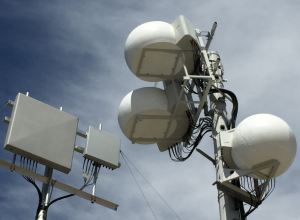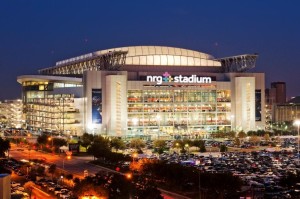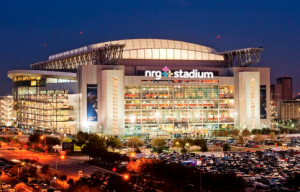
The two “sliced” balls in the center are AT&T’s new “Ten-Ten-Antenna,” so called because it delivers 10x the cellular coverage of any previous such device. Photo: AT&T
NRG Stadium, also home to the NFL’s Houston Texans, is slated to host Super Bowl LI next Feburary, and as such will be getting a new Wi-Fi network built by 5 Bars with gear from Extreme Networks ahead of the biggest big game. Unfortunately for data-hungry hoops fans, construction on that network won’t start until after the Final Four, meaning it will be cellular-only for the fans and followers at the championship weekend games.
But connections for customers of major carriers should be fine, since AT&T has already spent $25 million on Houston-area DAS upgrades, including at the stadium itself as well as at the convention center and other areas hosting Final Four activities. There will also be a portable Cell on Wheels, or COW, outside the convention center, where AT&T’s ball-shaped directional antennas will be bringing extra capacity to the scene.
Verizon said that it has already spent $40 million on improving its cellular infrastructure in and around NRG Stadium; inside the venue Verizon said its updated DAS deployment has 783 antennas, able to handle four times the capacity of the previous infrastructure. Outside the stadium Verizon said it has implemented an outdoor DAS to cover parking lots and tailgating areas. Verizon said it is also targeting downtown areas and the Houston airport for improvements ahead of Super Bowl LI.
At some of the regional tourney sites, third-party neutral host ExteNet Systems has been busy as well, adding capacity to some of its stadium DAS deployments as well as to one Wi-Fi network it runs at the Dunkin’ Donuts Center in Providence, R.I. At the Wells Fargo Arena in Des Moines, Iowa, ExteNet recently added U.S. Cellular to its DAS deployment, the first venue in which U.S. Cellular has been an ExteNet customer. Other ExteNet deployments that will see men’s or women’s NCAA games this year include the Barclays Center in Brooklyn, N.Y.; Bankers Life Fieldhouse in Indianapolis; and the Webster Bank Arena in Bridgeport, Conn.
In Denver at the Pepsi Center, a new (but not yet publicly announced) Wi-Fi network using Avaya gear should get a good test if it is live for the regional games there this weekend. With all these and more, if any fans or venues want to send speedtests in or post-games stats, we’ll happily print them.








